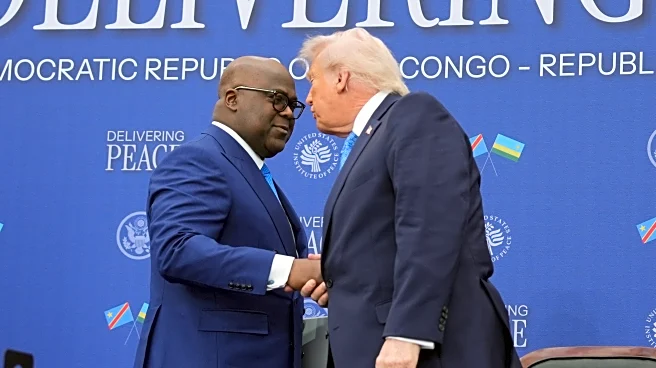What's Happening?
Mexican President Claudia Sheinbaum has firmly rejected the possibility of United States military intervention in Mexico, despite threats from President Trump. Sheinbaum clarified her stance during a news
conference, stating that she has communicated her position multiple times to Trump and Secretary of State Marco Rubio. The U.S. has conducted 21 missile strikes against alleged drug-smuggling boats, resulting in 83 deaths, but has not provided evidence linking these boats to drug trafficking. Trump has suggested expanding the campaign to include land-based targets in Mexico, but Sheinbaum emphasized that no foreign intervention would be allowed on Mexican soil.
Why It's Important?
The rejection of U.S. military intervention by Mexico highlights the tension between the two countries regarding drug cartel operations. President Trump's aggressive stance and military actions have been criticized by international legal experts as illegal extrajudicial killings. The lack of evidence provided by the Trump administration raises concerns about the legitimacy of these operations. Mexico's refusal to allow U.S. intervention underscores its sovereignty and the potential diplomatic strain between the nations. The situation also reflects broader issues of international law and the use of military force in foreign territories.
What's Next?
The ongoing tension between the U.S. and Mexico over military intervention could lead to further diplomatic discussions or conflicts. President Trump has indicated a willingness to expand military operations, but Mexico's firm stance against intervention may result in increased diplomatic efforts to resolve the issue. The international community may also weigh in on the legality and ethics of the U.S. actions, potentially influencing future policy decisions. The situation remains fluid, with potential implications for U.S.-Mexico relations and regional stability.
Beyond the Headlines
The broader implications of the U.S. military actions against alleged drug-smuggling operations include ethical and legal concerns about extrajudicial killings. The designation of cartels as 'enemy combatants' by President Trump raises questions about the application of international law and the justification for military intervention. The situation also highlights the challenges of addressing drug trafficking through military means and the potential impact on civilian populations. The international community may need to consider alternative approaches to combat drug trafficking that respect national sovereignty and human rights.










